Faith and Politics
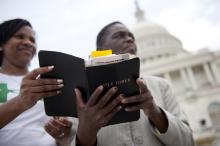
Learning to speak as a Christian is one of the most important and often ignored aspects of our discipleship. Nowhere is this fact more obvious than when churches try to talk about politics. When the small group leader makes a disparaging comment about Mitt Romney’s Mormon faith, or a car rolls into the church parking lot with a “NOBAMA” bumper sticker proudly displayed, what do we do?
Is bumper sticker propaganda and negativity the best we have to offer?
Admittedly it can be risky to talk about politics in the local church. All it takes is one idea or statement that flies in the face of someone’s deeply held convictions and that could be the end of our influence and the end of that person’s involvement in our ministry.
Still, the upcoming presidential election will be the defining cultural event of the next six months. If we completely ignore it we are missing a golden opportunity for discipleship.
How can churches have a healthy conversation about politics in the middle of a national election without demonizing the opposition and causing disunity?
I’ve been working on this question for months now, and as part of my preparation I wrote a book called Public Jesus. Here’s a little bit about what I’ve learned in the process:
1) Love the One You’re With
Zeenia Framroze, a student at Harvard University, spoke in April at Georgetown University Berkley Center's Millennial Values Symposium. She speaks in this clip on how the Millennial generation faces its challenges for the future in light of diverse value systems.
"If we stop listening to each other, if we try to impose our values on another group, we lose the noteworthiness of our values itself. We need to have some faith in democracy and some faith in the marketplace of ideas and values," Framroze said. "We'll bicker and fight, but ultimately we'll have a far more worthwhile discussion."

One of the things that make America so great is the ability to express yourself, much to the joy, and even pain, of those around you. The freedom of speech is a two-edged sword and more often than not the one who wields it doesn’t fully grasp the power behind it.
Sadly there is no better example of poor usage of this freedom than when directed at the political arena. While late night talk show hosts have always taken shots at the President; now with social media outlets everyone has their two-cents to share … truth is most people would do well to learn the value of biting their tongue.
While I find great joy in the liberty found within the Freedom of Speech, I’ve come to realize that while it’s an American right it’s also much bigger than that … it’s a human right.
However, it’s not a Christian’s right.
Nicholas Watt writes for The Guardian:
"Nick Clegg's hopes of reforming the House of Lords, completing a journey begun a century ago by his Liberal predecessors, ran into severe trouble on Tuesday when 91 Tory MPs defied a three line whip to vote against the measure in the largest rebellion of the parliament. A furious David Cameron confronted the leader of the Tory rebellion just outside the House of Commons division lobbies late on Tuesday night as it became clear that normally loyal Tory MPs were determined to register their opposition to House of Lords reform."
Learn more here
We love a good infographic--and here's one more.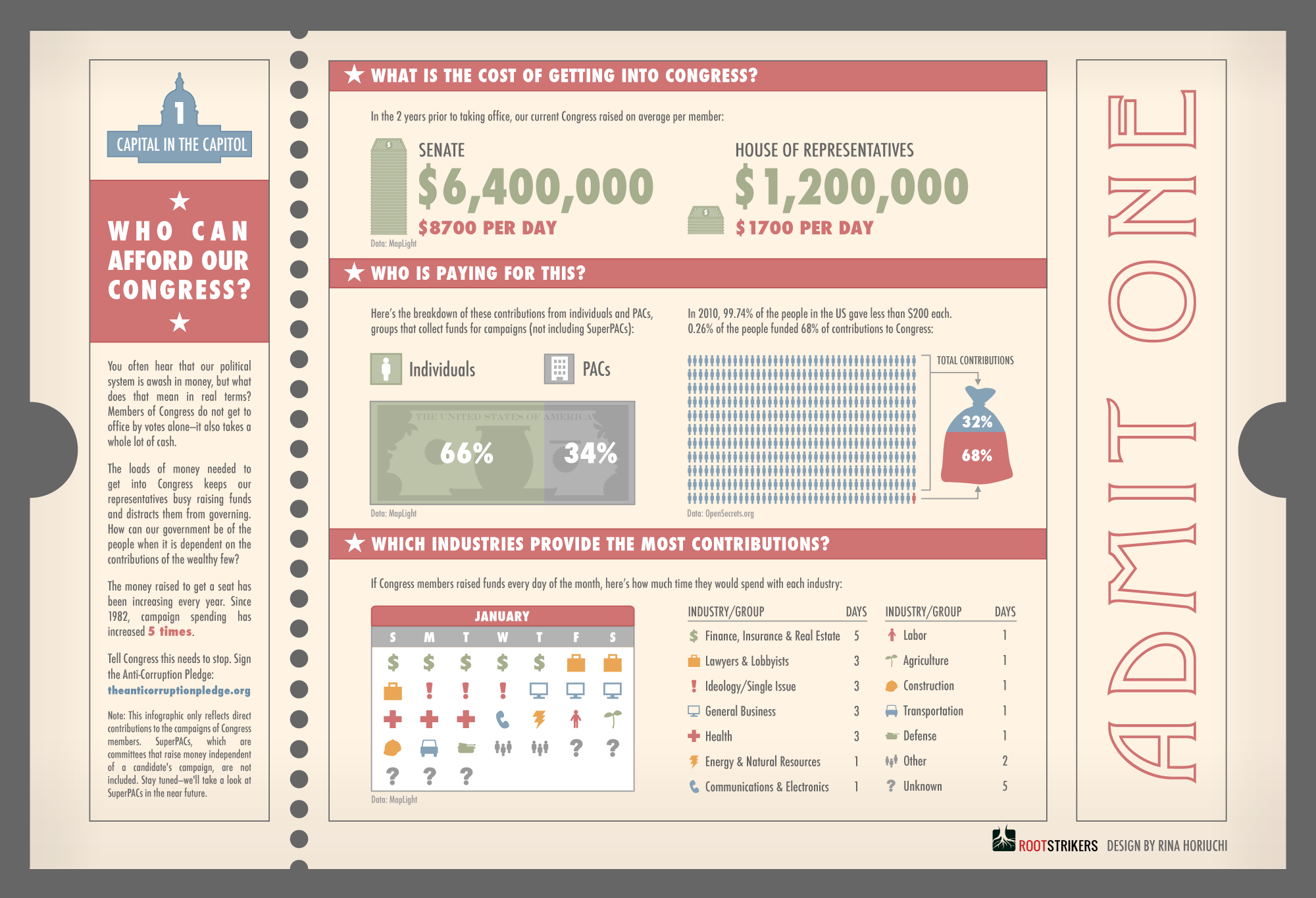
Capital in the Capitol: What's the Cost of Getting into Congress?
A few key numbers to look at-- in the 2 years prior to taking office, the after Representative raises $1700 a day. If you're trying to be a Seantor? Try $8700.
What does that mean? Are they actually running this country? No way. Try breakfast, lunch, and cocktails with high-dollar donors.
Take a look. Thanks to Upworthy for finding this great piece.
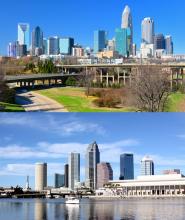
They have the two of the most stressful jobs in the country, at least for the next couple of months. Mayors Bob Buckhorn of Tampa, Fla., and Anthony Foxx of Charleston, N.C., will play host to the Republican and Democratic national conventions, respectively.
The two sat down with Politico's Chief White House Correspondent Mike Allen on Tuesday to discuss the challenges, economic opportunities, and politics of hosting such historic, national events.
"I don't look at this as a political event," Buckhorn said. "… Yes, I am a Democrat, but I intend to be the best host the Republicans have ever had."
For more than a year, Prudhomme’s Lost Cajun Kitchen in Lancaster County, Pa., has offered a Sunday special: Diners who bring in a current church bulletin receive 10 percent off the purchase of their dinners.
But the promotion rubs some people the wrong way, including John Wolff an atheist and member of the Freedom From Religion Foundation.
Wolff, a Lancaster resident who said he's never been to Prudhomme’s, recently filed a complaint with the Pennsylvania Human Relations Commission claiming the 22-year-old restaurant should not give discounts based on religion. “I bear them no ill will," he said, "but they shouldn’t be pushing religion."
Youcef Nadarkhani, the 35-year-old Christian pastor has been imprisoned in Iran since October 2009 after protesting a law that all children read the Quaran and being charged with evangelizing to Muslims. The trial date has been set for Sept. 8.
From the Christian Post:
"According to Present Truth Ministries, which has been closely monitoring the pastor's case, Nadarkhani will presumably be tried for crimes against security. 'We assume by implication that this means the charges of apostasy have been dropped since the new charges have been issued, but we have no confirmation of that,' the ministry said Thursday."
From the Associated Press via STLToday.com:
JOPLIN, Mo. — The FBI has joined an investigation into the second fire at a Joplin mosque in four years.
The blaze early Wednesday burned a 4-by-6-foot section of shingles atop the Islamic Society of Joplin's building. Firefighters extinguished the flames before they could do further damage, authorities told The Joplin Globe.
Capt. Kelly Stephens of the Jasper County Sheriff's Department said investigators were studying security camera footage but he would not say what the tapes showed.
About 50 families are members of the Islamic Society of Joplin, which opened the building in 2007 as a mosque and community center, society officials said. The FBI led an investigation in 2008 when the mosque's sign was torched; that crime remains unsolved.
For The Daily Beast, Jamie Dettmer writes:
"At times there are two competing realities in post-Gaddafi Libya. For most ordinary Libyan women, there’s domestic drudgery and subordination to their men. For the more educated, drawn from higher ranks and involved in newly minted nongovernmental organizations (NGOs), there’s hope of change and greater opportunities.
The two realities seldom meet. As Libyans head to the polls this weekend to vote in their first national elections in nearly 50 years, there are two fundamental questions to ask about the prospects for women in post-Gaddafi Libya. Will those two realities ever start overlapping? And will the space that elite women have opened up since Gaddafi’s fall be reduced?"
Read his full article here

It may have been buried in the bombastic July Fourth news cycle, but something amazing happened yesterday: scientists in Geneva have found the God particle.The Higgs boson, the elusive, “final puzzle piece” could help complete our current understanding of physics and supposedly explains why objects have mass.
And just cause scientists are really good at keeping people’s heartbeats low, let’s make sure we say they didn’t find it, but they “observed a new particle consistent with a Higgs boson” and are more than 99-percent certain that it is what they think it is.
Why is this a big deal?
It just is. If nothing else, it opens another conversation with scientists, Christians, and anyone who has ever wondered “why are we here?”
New particles don’t get found every day, you know? Link ahead to someone who knows a WHOLE lot more about this than we do. Here’s The Wall Street Journal’s take.
And for your amusement, a pretty infographic: Are you there, God? It’s us, scientists.

We elect a president every four years, but perhaps we also elect a high priest. Ever since George Washington spontaneously added “so help me God” to his inaugural oath, Americans have expected their presidents to believe in, worship and publicly invoke God....
History suggests, however, that piety and presidential performance don’t always match. Some of America’s most religious presidents have been its most brutal. And two of its greatest presidents wouldn’t even be considered Christians today, scholars say.
Consider Abraham Lincoln, who is widely acknowledged as one of the nation’s three greatest presidents, along with Washington and Franklin Delano Roosevelt. But Lincoln, who never joined a church, was not a Christian, says Niels C. Nielsen, author of God in the Obama Era.
“Lincoln believed in an active God, he believed in providence. But if you asked Lincoln if he believed in the deity of Jesus, he would have said no,” Nielsen says.
Or look at Roosevelt, who is virtually a national saint. With his perpetual grin and a cigarette holder perched jauntily in his mouth, he guided the nation through the Great Depression and World War II. His legacy is built on his New Deal, an array of programs that protected the poor and elderly from the abuses of unrestrained capitalism.
But Roosevelt was no saint in his personal life. He rarely talked publicly about his Episcopal faith, preferred golf over church (before he was stricken by polio), and likely cheated on his wife, scholars say.
Read Blake's report — which also examines the faith of Lyndon Johnson, Richard Nixon, Andrew Jackson, Thomas Jefferson and Barack Obama — HERE.
A group of about 150 Mormons quit their church in a mass resignation ceremony in Salt Lake City on Saturday in a rare display of defiance ending decades of disagreement for some over issues ranging from polygamy to gay marriage.
Participants from Utah, Arizona, Idaho and elsewhere gathered in a public park to sign a "Declaration of Independence from Mormonism." ...
After gathering in the park, participants hiked a half-mile up nearby Ensign Peak, scaled in 1847 by church President Brigham Young to survey the spot where his Latter-day Saints would build a city.
At the top, those gathered gave three loud shouts of "Freedom," cheered, clapped and hugged.
Read the report in its entirety HERE.
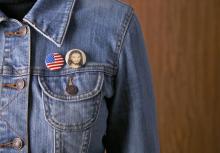
Recently, someone asked me to respond (on video) to how I reconciled both love of God and love for country. I struggled with the question, mostly because of the typical baggage that comes along with Christian patriotism, much of which teeters on the verge of jingoism. So I didn’t respond at all.
I’m really sensitive to what I call “Christian exceptionalism.” There are those within Christianity that honestly believe America is God’s second Zion, the new Israel, and that we Americans are God’s new chosen people. This, in turn, helps justify everything from flags in worship spaces to the Ten Commandments in the public square, and even pre-emptive acts of aggression against perceived threats around the world.
Basically, when you hold yourself up as somehow favored in the eyes of God, it’s easy to hold those you deem as less favored to be somehow “less than,” and to dehumanize all who do not conform to your custom-built ideal of what it means to be “American.”
For me, though, such sentiments not only are un-American in the sense that they don’t ascribe to the “liberty and justice for all” ethos; it’s also patently un-Christian.
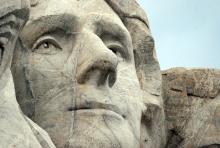
During a recent trip to Washington, D.C., I took in two exhibits on Thomas Jefferson at the Smithsonian's National Museum of American History: one on slaves at Monticello and the other on the cut-and-paste version of the Gospels known as the Jefferson Bible.
In the first exhibit, I was informed that our third president likely fathered children with his slave Sally Hemings. In the second, I was told that the Jefferson Bible was a "revolutionary document."
This is the sort of stuff that drives David Barton mad. Barton is an evangelical minister and the founder of WallBuilders, a "pro-family" organization dedicated, according to its website, to "presenting America's forgotten history and heroes, with an emphasis on the moral, religious and constitutional foundation on which America was built." Like many of his fellow travelers on the Christian right, Barton is convinced that his heroes are under attack, and he has no intention of turning the other cheek.
In his new book, The Jefferson Lies, Barton argues that academics have spread a series of falsehoods about Jefferson — that he was a racist, a secularist and an advocate of strict church/state separation. Barton thinks he knows better. His Jefferson, who died (appropriately enough) on July 4, 1826, wasn't just an "American hero." He was an orthodox Christian, too.
Lionized by Glenn Beck and other social conservatives, Barton is a culture warrior driven by desire rather than by evidence. As a result, his writing is more "truthy" than "truthful."
Proponents of "America as a Christian nation" ideology like to point to our founding fathers' faith, however shoddy the details of said faith, to make their arguments. Case in point, David Barton of WallBuilders, whose book The Jefferson Lies touts Thomas Jefferson as an orthodox Christian.
Stephen Prothero in his latest column for USA Today, points to Barton's (and others like Glenn Beck's) talking points as indicative of the larger issue of extreme factionalism that stretches the truth for its own means.
From the column:
"In our nation's capital, many Republicans and Democrats now treat their political opponents as mortal enemies at war with all that is good and godly in America. And the Supreme Court, which used to be seen as "above" politics, is under closer scrutiny than ever after a string of hotly contested 5-4 rulings. This fervent factionalism is not confined to politics and law, however. It is leeching into science and history. As musician David Byrne of The Talking Heads once put it, even facts now have a point of view."
Politics is a true American idol, and the 2012 election will dramatically demonstrate that reality.
People of faith should never worship at the altar of politics, because we worship God; the kingdom of God is never the same as the kingdoms of politics. Our worship of God should shape our engagement with politics. When politics shapes our religion, it distorts our true worship.
Rather than becoming the chaplains or enablers of political idolatry, the faith community should confront it. The idols of politics are many: the idol of money over democracy, the idol of celebrity over leadership, the idol of individualism over community, the idol of ideology over civility, and the idol of winning over governing. Both sides take a problem and do two things: make us afraid of it, and then blame it on the other side. What they don’t do is work together to solve our problems, finding solutions for the common good.
What caused me to rethink these questions of faith and politics was my encounter earlier this year with a lion in a monastic community overlooking the Pacific Ocean at the beginning of my sabbatical. Entering into solitude and silence with monks, punctuated only by Vigils, Lauds, Eucharist, and Vespers, can alter a person’s perspective. In the monastery’s guest kitchen library, I spotted the Chronicles of Narnia, by C.S. Lewis, and decided to reread them. Aslan the lion is the creator and leader of Narnia, the true and good king, and the stories’ Christ figure. Because I was beginning to write a book about the common good, with Jesus as the inspiration for it, I was again drawn to Aslan.
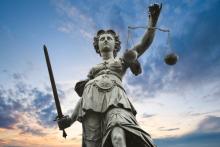
On Thursday, the Supreme Court ruled that the federal government does hold the constitutional power to mandate that most American's purchase health insurance or pay a penalty. This power is maintained in Congress’s ability to levy taxes.
The justices also ruled that the federal government does hold the constitutional power to expand Medicaid, making more people eligible to receive the benefit, but, like the original Medicaid law of 1965, states can opt out of the expansion if they so choose.
What does this mean? And what does this mean for Jesus followers?

Where there is no vision, the people perish. ~ Proverbs 29:18
Thursday’s Supreme Court ruling on the constitutionality of the Affordable Care Act was remarkable in a number of ways. The vast majority of articles, blogs, and analyses focus on the political ramifications of the decision.
Is this a win for the Obama administration or fuel for the Romney campaign? Pundits have looked at nearly every political angle, from the upcoming presidential election to its effects on local politics.
While I appreciate the political analysis and the importance of political processes to the wellbeing of the United States, I believe that a majority of coverage has missed one of the most remarkable points of the ACA: It changes the vision of our national community.